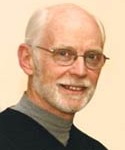Remembering my friend, Mike Mahoney – By Charles Stenard, September 23, 2008
I remember Mike from as far back as our overlapping undergraduate years at Harvard (1956-58), and subsequently at Princeton, a few years later, as we completed graduate studies – Mike in history of science, I in mathematics (1967). Our wives met at the Wyman Club for graduate student spouses and have been friends since.
Mike was always interested in mathematics, and would pose questions to me that I had no clue how to answer – questions that were profoundly interesting, typically about the possible origins of a seminal mathematical idea that came to pervade our culture today. (One such discussion, taking place at a holiday dance for graduate student couples, pertained to the early development of symbolic reasoning that became the intellectual seeds for algebra, logic, and computers. I quickly realized the depth of his question, and from his clarifications, I knew that he was already way beyond my utter lack of any notion of the topic.)
Many years later, circa 1987-1988, as a member of Bell Labs, I invited Mike to work with me to address a challenging problem of re-hosting a huge number of diverse computer programs for the U.S. National Weather Service. There were perhaps 100 million lines of software to be converted, controlled, and made available to meteorologists for experimentation with new forecasting techniques. I enlisted Mike, knowing that he was an expert on the software productivity crisis of the 1960’s and 70’s. He joined me at Bell Labs, and we enjoyed a very productive summer and several months beyond. My technical colleagues could not at first understand the role of an historian, but I called Mike my “secret weapon” and he soon proved my point. We had a wonderfully stimulating time. Mike got to know the minds of the software and computer researchers at Bell Labs, which he absorbed in his analysis of the modern software revolution.
Mike always had superb taste for penetrating topics of sweeping historical and scientific perspective. At a seminar at the Institute for Advanced Study on the role of sketches in creativity (circa 2003), Mike brilliantly showed Huygens’ sketches of the cycloidal patterns guiding a flexible pendulum suspension as used in the first isochronous pendulum clock, enabling accurate longitude measurement crucial to navigation. Mike’s explanation of the sketches made it evident how it works. Another example is a public lecture Mike delivered about why the West has led the technology revolution, dating from circa 1600 to now. He gave a compelling analysis that technology was “mathematicized” early and uniquely in the West. He demonstrated an enormous breadth of understanding of the historical unfolding of mathematical invention, and the role of a very few super-geniuses concentrated in the West making huge leaps that were elaborated upon by the mathematical and scientific communities around them. These examples illustrate his marvelous gift to choose pivotal topics for research, draw often-surprising conclusions, and make his research crystal clear to others.
I value our conversations and collaborations over the years. I was privileged to be a good friend.
